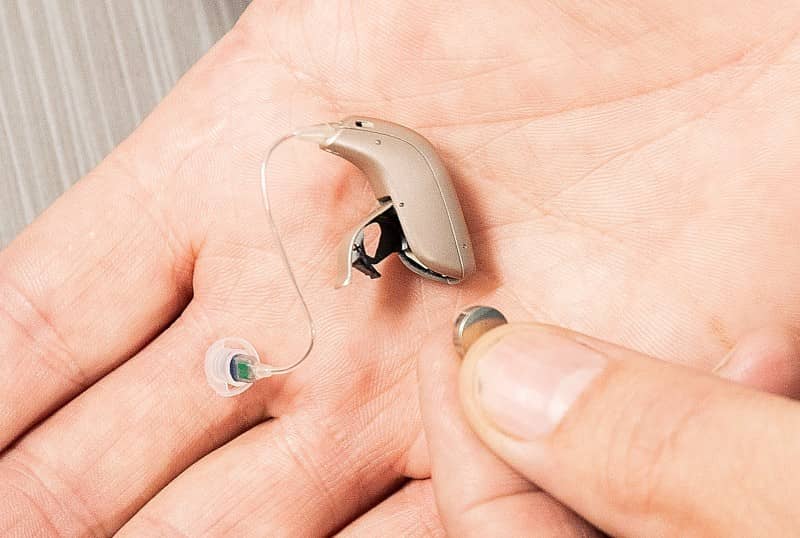|
www.HealthyHearing.com |
Hearing aid battery safetyIf you use disposable hearing aid button batteries, follow smart safety rules
Contributed by Debbie Clason, staff writer, Healthy Hearing Hearing aids are powered either by rechargeable batteries or small, disposable "button" batteries. Although rechargeable hearing aids are quickly becoming the more popular battery option, many people still use hearing aids with disposable batteries. These batteries keep hearing aids working at their optimum performance, but did you know they can cause serious injury or death if they’re not handled properly? 
away from children and pets. Batteries contain mercury, silver, lithium and other heavy metals as their main component. When these chemicals are ingested and come in contact with body fluids, they create an electrical current which can burn through tissue and seriously damage internal organs in as little as two hours’ time. When you handle a leaking battery, it can cause serious burns immediately. This is true no matter if the batteries are fully charged or no longer power your hearing aids. My child swallowed a button battery. What do I do?
This is a medical emergency and you should not attempt first aid at home. If the child is older than one year, give them about two teaspoons of honey every 10 minutes until they are in the ER. Honey can help slow the development of an internal battery burn injury, but it will not stop it from occurring. Do not delay medical care. If ingested, button batteries can cause serious internal burns, bleeding and injuries. Numerous children have either been severely injured or died from ingestion. For babies (under one year), they need an x-ray immediately to locate the battery. If the battery is in the esophagus, it must be removed immediately. Serious injury including death is possible. In older children, follow your doctors' guidance. They will most likely need the battery removed using an endoscopy procedure. If you're not sure if your child has ingested a button battery, signs to look out for include wheezing, drooling, vomiting, chest discomfort, difficulty swallowing and gagging when eating or drinking. Damage can also occur if a child puts the battery in their nose or ear. Storing your disposable hearing aid batteries safelyNow that you know, you can see why it’s important to keep your hearing aid batteries safe from little hands or inquisitive pets. It’s important to find a safe place to store your batteries. Here are some dos and don’ts:
How to properly discard your batteriesWhen you change your hearing aid batteries, be sure to place them in a child- and pet-proof container immediately until you can take them to a recycling center. Do not leave them on a counter or throw them in the trash can. Batteries are recyclableBecause of the valuable metals these batteries contain, they’re extremely recyclable. Those same contents make them extremely hazardous if you simply throw them in the trash. Over time, the batteries can leak these hazardous chemicals and contaminate the environment. Recycling centers extract the dangerous chemicals and discard the remaining contents, which are safe for landfills. In this day and age, it’s likely there are more than a few battery recycling collection centers in your community. If you aren’t already aware of their location, check with your hearing center. Acid burnSometimes, batteries can leak acid that can burn your skin. If you receive an acid burn when handling your hearing aid batteries:
Debbie Clason, staff writer, Healthy Hearing
|
Featured clinics near me
Earzlink Hearing Care - Reynoldsburg
7668 Slate Ridge Blvd
Reynoldsburg, OH 43068

Find a clinic
Need a hearing test but not sure which clinic to choose?
Call 1-877-872-7165 for help setting up a hearing test appointment.


 Debbie Clason holds a master's degree from Indiana University. Her impressive client list includes financial institutions, real estate developers, physicians, pharmacists and nonprofit organizations.
Debbie Clason holds a master's degree from Indiana University. Her impressive client list includes financial institutions, real estate developers, physicians, pharmacists and nonprofit organizations.